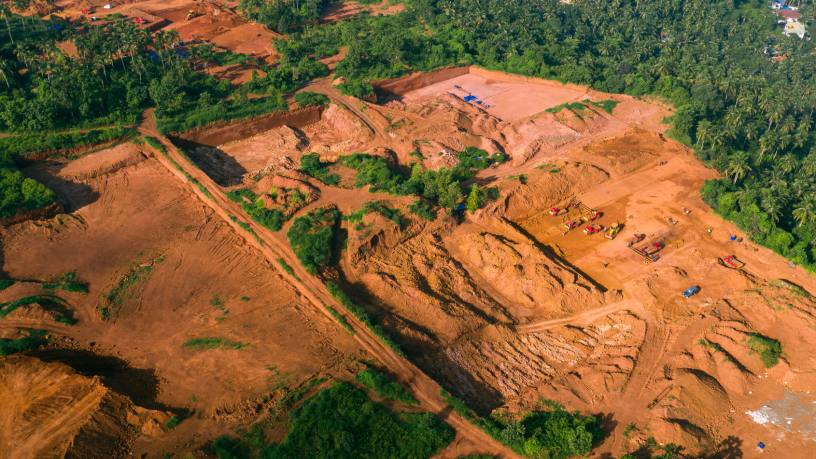As international banks begin squaring their client portfolios with the goals of the Paris Climate Agreement, a powerful tool is emerging in the fight against climate change: stopping bank support of deforestation.
Bank lending to companies linked to deforestation turbocharges not only climate change, but a whole host of closely linked issues, including biodiversity loss, pandemic risk and violations of indigenous peoples’ rights. The fires that now regularly engulf tropical forests dramatically illustrate the risks of agribusiness and livestock expansion in tropical forest regions.
Some banks have started addressing their role by adopting policies to enhance due diligence on clients in high-risk commodity sectors linked to deforestation — such as palm oil, timber, pulp and paper, soy, rubber and beef, also called ‘forest-risk commodities’. And while banks are adept at building loopholes into their commitments, or setting goals too far into the future, these policies are starting to coalesce around critical standards such as ‘No deforestation, no peatland, no exploitation’ (NDPE). This benchmark is designed to address not just deforestation, but the intense climate risks associated with peatland development, as well as labour- and land-rights issues.
The conservative Japanese megabanks — major financiers of deforestation in southeast Asia — are the latest group of banks to begin adopting NDPE policies, following NDPE policy adoption by some European banks over recent years. Even government-linked banks from Malaysia — a major producer of palm oil, timber and rubber — have started to lay out tentative NDPE commitments.
China out of step
China’s financial sector, however, is conspicuously out of step. Take Industrial and Commerce Bank of China (ICBC), for instance, the world’s largest bank by assets. It is a signatory of the UN Principles for Responsible Banking, which commits banks to align lending with the Sustainable Development Goals (SDGs) — including the already missed SDG15 target to halt deforestation by 2020. Yet ICBC has still not published any policies setting out the standards it expects of forest-risk sector clients, while keeping the money flowing to them.
This is concerning, given China’s financial sector is the second largest financier of forest-risk commodities globally. According to a study by Forests and Finance, a transparency and accountability initiative by a global coalition of non-governmental organisations (NGOs), Chinese financial institutions provided around $15bn in loans and underwriting services between January 2016 and April 2020 to companies involved in forest-risk commodities in southeast Asia, Brazil, and central and west Africa. Chinese bank lending is surpassed by only Brazilian banks, which predominantly finance their own domestic soy, beef and pulp and paper industries.
ICBC has still not published any policies setting out the standards it expects of forest-risk sector clients, while keeping the money flowing to them
For obvious reasons, state-linked Chinese banks have not been buffeted by the same kind of pressure from activist shareholders and NGO campaigns as seen in Europe or the US. Such pressure has pushed some banks to improve sustainability disclosures and to adopt stronger policies on climate, deforestation and related social issues. Chinese bank environmental standards are mainly driven by state policy, such as the Green Credit Guidelines. When launched in 2012, these guidelines were arguably ahead of other jurisdictions, including the EU. However, they lack legal weight and are often poorly implemented. They also fail to provide the detailed criteria needed for financial institutions to address specific sector risks.
Indonesia’s pulp duopoly
Major recipients of Chinese bank finance are known to have poor environmental and social performance, including legal violations. An important example of this is Chinese bank financing for Indonesia’s pulp paper duopoly — Asia Pulp and Paper, part of the Sinar Mas Group, and April Group, part of the Royal Golden Eagle Group.
Finance to these two corporate groups accounts for approximately one-third ($5bn) of China’s overall forest-risk financing captured in the data. The enormous pulp mills of these two groups rely on a vast supply of wood fibre, much of which is grown on deforested carbon-rich peat soils. When cleared and drained of standing water, these areas dry out and release flammable greenhouse gases. This process is fuelling Indonesia’s recurring fire and haze crisis, and making it one of the world’s largest greenhouse gas emitters. In both 2015 and 2019, emissions from such fires surpassed the annual emissions of the global aviation industry. At the peak of the fires, they even exceeded the daily emissions of the entire US economy. In addition to the devastating impact on biodiversity and climate, these groups are also embroiled in hundreds of land rights conflicts with local communities.
The planned revision of China’s commercial banking law, as set out in its recently published 2021 legislative agenda, provides an important opportunity to raise Chinese bank environmental standards. This should also be seen in the context of sustainable finance reforms already underway in the EU, Brazil and other key banking sectors. Combined with the growing list of banks adopting voluntary NDPE commitments, the international financial sector could soon stop competing for business built on deforestation.
As the global economy enters a new commodity supercycle, with surging prices for forest-risk commodities such as palm oil, timber and soy, there will be renewed incentives for unscrupulous companies to encroach into and source from the world’s remaining tropical forests. Strengthened financial sector regulations, robust bank policies and heightened bank due diligence in all major economies would go a long way to help protect tropical forests and the invaluable public goods they provide.
Tom Picken is campaign director at Rainforest Action Network, part of Forests & Finance.












